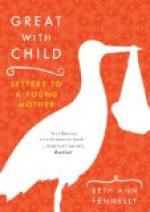SEC. 3. Nursing—how often.
Many lay it down, as an invariable rule, that no system can be pursued with a child till it is six months old; and it must be admitted by all, that for several months after birth there are serious difficulties in the way of determining, with any degree of precision, how often a child should be nursed or fed. Still, there are a few rules of universal application; some of which are here presented.
1. A child should never be nursed, merely to quiet it; for if this be done, it will soon learn to cry, whenever it feels the slightest uneasiness, not only from hunger, but from other causes; merely to be gratified with nursing. Besides, if its cries should happen to be from illness, it is ten to one but the reception of anything into the stomach will do harm instead of good.
2. The stomach, like every other organ in the body which is muscular, must have time for rest; and this in the case of children as well as adults. But to nurse them too frequently is in opposition to this rule, and therefore of evil tendency.
3. For reasons which may be seen by the last rule, there should be regular seasons for nursing, and these should be adhered to, especially by night. When very young, once in three hours may not be too frequent; I believe that it is seldom proper to nurse a child more frequently than this. But whenever three hours becomes a suitable period by day, once in four hours will be often enough by night. I will not undertake to say at what precise age children should be nursed at intervals of three and four hours each; because some children are older, constitutionally, at three months, than others are at four.
There is one grand mistake, however, against which I must caution young mothers; which is, not to indulge the vain expectation that feeble infants will become robust, in proportion to their indulgence. On the contrary, it is the more necessary to be strict with feeble children, because they are feeble. To keep them hanging at the breast to invigorate them, is the very way to counteract our own intentions, and defeat our own purpose. Seasons of entire rest are even more important to their stomachs than to those of other persons.
4. But in order to secure intervals of rest, both to the strong and the feeble, we must avoid the pernicious habit of giving infants pap, and other delicacies, “between meals.” Many a child’s health is ruined by this practice. Nothing should be put into their stomachs for many months—if they are in health—but the mother’s milk.
“This,” says Dr. Dunglison, “is the sole food of the infant, and is consequently sufficiently nutrient to maintain life, and to minister to the growth, during the earliest periods of existence.” [Footnote: Elements of Hygiene, page 271.] In another place, he says, “Milk is an appropriate nourishment at all ages, and is more so the nearer to birth.”




